Developing QA culture is a continuous process and it requires special attention to QA areas. In respect of current setting following quality assurance areas may be critical to develop the desired quality assurance culture in Bangladesh:
Governance:
Governance becomes a crucial issue in quality assurance in higher education. Governance at university encompasses the organizational structures, legislative framework and processes through which, policies and programs are developed, managed and delivered. Governance facilitates the achievement of the stated mission and objectives of the university. The central administration and statutory bodies like Board of Trustees, Syndicate, Academic Council and the Vice Chancellor are the powerful actors in university’s governance system. The players involved in ensuring the governance at the university includes all the administrative layers from top management to the program level management.
Curriculum Content Design & Review:
Curriculum refers to a well defined and prescribed course of studies, lessons and activities, which students must complete to fulfill the requirements for acquiring the degree. IQAC will facilitate the integration of the procedure in redesigning and modernizing the curricula to accommodate the job market requirements. The curriculum plays a crucial role in achieving the mission and objectives of the university including the intended learning outcomes and overall effectiveness of the programs.
Student: Admission Progress and Achievements :
Entry qualification: Quality of learners in terms of commitment and prerequisite qualifications are critical for quality education.
Admission Procedure: To get the quality intake it is very important to select the right candidates for the right academic programs.
Progress & Achievement: The quality assurance system of universities and higher education institutions should be in place to assure that levels of students’ achievements are maintained with due consideration for the use of external reference points and evaluation of achievement.
Physical Facilities:
Quality physical facilities are integral part of the quality learning opportunities at the university. For the purpose of quality assurance in higher education it is to be ensured that the facilities are appropriate, adequate and well managed. Physical facilities are important for strengthening effective teaching learning and provide quality education include:
- Classroom facilities must be adequate and well equipped
- Library facilities with broadband connectivity and access to Digital Library facilities must be adequate, accessible and useful
- Laboratory and field laboratories must be adequate, well equipped, accessible and useful
- Medical facilities must be adequate, well equipped, accessible and useful to provide emergency healthcare services ensuring health and hygiene within the campus
- Other facilities like clean, spatially adequate and separate leisure rooms for male and female students , canteen facilities with nutritious and safe food, reading rooms, theater, auditorium for staging cultural programs etc. 5.1.4.6 In addition, some discipline specific facilities, very critical for proper learning, need to be ensured. For example, clinic & hospital and farmland facilities for disciplines like Dentistry, Veterinary Science, Medicine and agriculture etc.
Teaching – Learning and Assessment
Teaching Learning -For the purpose of quality in teaching learning following factors are very critical:
- Quality Staff: It is to be ensured that the staffs of all categories including academic, support, technical and administrative are adequate and skilled to meet the requirements of academic standards and strategies of teaching learning.
- Appropriate teaching learning methods: Teaching learning method, in fact, sets the stage for everything in terms of learning outcomes. Efforts in this area pay great dividends in terms of attainment of learning goals and quality of education as well. Attainment of learning goals depends on the role and involvement of students and teachers in the process. Teachers need to be diligent in transferring new knowledge to the students effectively so that the goal of teaching succeeds. The teachers should use innovative teaching techniques to make the students keen, focused and interested to learn the subjects taught, and are able to maintain a scholarly approach for engaging students in academic activities.
- Use of Lesson plan: Use of lesson plan is a growing practice in teaching learning internationally. It specifies the subject matter to be taught, learning objectives and assessment of that learning for each and every class. As a result, at the beginning of a session students become very clear regarding what will be taught, how it will be taught, how the attainment of learning will be assessed and subjects they supposed to learn.
- Technology integration: In this age of information technology work has become increasingly computer centric. As such, technology integration in teaching is very critical for quality in education. Technology integration in teaching learning will make it a lot easier and more effective to communicate ideas and complex subjects meaningfully in class rooms. In addition, use of technology in teaching will encourage students to access e-resources for studying, use computer for academic preparation and IT devices for problem solving.
- Focus: Teaching learning in higher education must address the higher order of learning in educational domain, i.e., application for creation. At the tertiary level of education heightened cognitive skills are very important.
- Skill Development Mechanism: It is required to keep in mind that education is all about to gain a set of skills. Such skills will make the graduates competent to face the reality of life, to develop the attitude of lifelong learning and to contribute in the socioeconomic development of the country. As such, teaching learning should not be confined within the class room only. Classroom learning is not enough to develop the desired skills. Universities must have a comprehensive skill development plan incorporating the curricular, co-curricular and extra-curricular activities.
- Student performance Assessment Student Assessment is comprised of a set of activities to measure the attainment of learning outcomes. Assessment is a systematic process of collecting, analyzing and interpreting information to determine the extent to which learning objectives have been achieved. Assessment creates a basis for judgment on the performance of student. Thus, effective and appropriate performance assessment approach is very important to judge the level of attainment of learning outcomes and skill development. It needs to be confirmed that students are well informed about the criteria, processes, techniques, tools and rubrics that will be used to assess performance. Like teaching learning student performance assessment approach must be focused on higher order learning.
Student Support Services
- Academic guidance and counseling: Academic environment at the tertiary education is significantly different from that of secondary and higher secondary level. It is very critical to guide the students so that they can cope with the challenges and opportunities of university life. Sufficient and proper academic guidance and counseling beyond regular class-room lecture time is very effective in making the students serious regarding studies and motivate them to explore the ever expanding frontier of knowledge.
- Co-curricular & Extra-curricular Activities: Co-curricular and extra-curricular activities are the integral part of the skill development mechanism. University must have some departments or centers like Department of Physical Education, Teacher Student Cultural Centre (TSCC) and facilities to stage drama, hold debates, musical soiree, publish journals and exhibit fine arts. In addition, at the department or program level students association or society, like debating club, environment club, culture club etc. should be allowed. These organizations shall be developed with specific responsibilities or terms of reference to organize sports, entertainment programs and cultural activities on a regular basis involving students.
- Career& Placement: Quality of graduates is mostly measured by the employability and extent of contribution to the organizations, community and national development.. All types of jobs are not necessarily suitable for all students. Career counseling and placement arrangement may play a very critical role to get the right job opportunities and selecting suitable career path.
- Alumni Services: Well organized alumni association is very effective to get in touch with the industry and working life. It would also help the university to develop institutional network and university industry collaboration (UIC) for promoting research and placement of the graduates.
- Community Services: The quality assurance system needs to ensure that the university makes a significant contribution to the community, to the society and to the country. Community involvement is an effective way of understanding the social issues and working with people. Community involvement aims to improve students’ knowledge, skills and confidence and organizational ability and resources. Community involvement makes an important contribution towards promoting lifelong learning, social inclusion and active citizenship.
Staff and Facilities
- Recruitment: To employ competent people, university must have a transparent and appropriate recruitment policy for both academic and non-academic staff that would facilitate selection of the right person for the right job. Universities are required to maintain reasonable teacher student ratio suitable for particular discipline.
- Staff Development: Quality assurance recognizes the importance of training and development. Training is very important to enhance the professional skills of the staff and to keep them up-to-date with best practices in quality assurance. University must have a well organized staff development policy and programs for its implementation including setting up of a training institute.
- Career Development: University must have service rules for the career development of its staff. In addition, university must have provisions to allow and motivate faculty members for further higher study and advanced research.
- Key Performance Indicators (KPI): Well defined KPIs may act as a source of motivation and means to ensure accountability of staff. Performance of an academic institution or faculty members should not be confined to producing graduates only. It is important to have specific performance and success indicators that contribute to graduates’ skills development, teaching learning, research and extension services, national and international recognition and contribution to socioeconomic development.
Research and Extension: The core objective of higher education is to contribute to the sustainable development and improvement of society as a whole. It is undeniable fact that research forms the basis of creativity and innovation, which is regarded as critical for sustainable growth and development. Research also makes teaching learning effective and practice oriented. University must develop capacity with appropriate facilities and provisions to
- undertake cutting edge research
- give due recognition and priority to research
- motivate faculty members and competent students to go for research and innovation
- explore the possibility of corporate funding for university industry research collaboration.
- disseminate and transfer the research findings from laboratory to the field through extension services
- apply for patent and commercialize the patented product; and,
- establish commercial arms for doing business.
Continuous Improvement
Universities must have set policies and institutional set up for quality assurance. Top management of the university should have commitment for developing quality culture which recognizes the importance of quality and quality assurance in practice. As an explicit evidence of such commitment IQAC should develop and implement a strategy for the continuous enhancement of quality.

